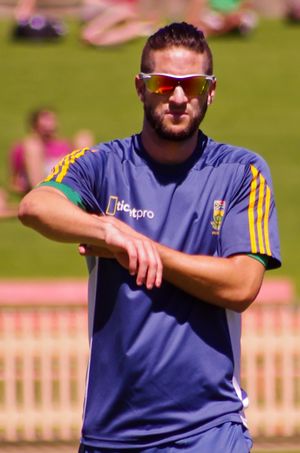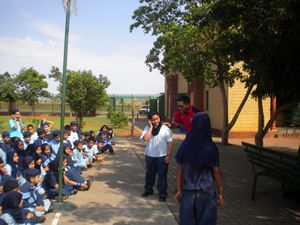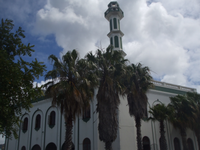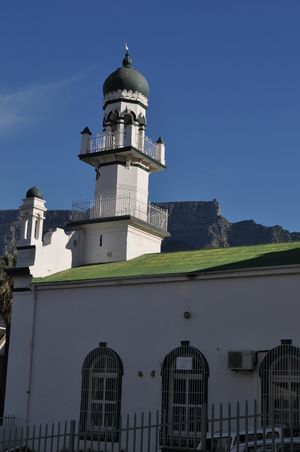الإسلام في جنوب أفريقيا
|
جزء من السلسلات حول

|
الإسلام في جنوب أفريقيا هو دين أقلية، يمارسه نحو 1.6 إلى 1.9% من السكان. It is also one of the fastest growing religion in South Africa.[1][2] Islam in South Africa has grown in three phases. The first phase brought the earliest Muslims as part of the involuntary migration of slaves, political prisoners, and political exiles from Africa and Asia (mainly from the Indonesian archipelago) that lasted from about 1652 to the mid-1800s. The second phase was the arrival of indentured labourers from British India to work in the sugar-cane fields in Natal between 1860 and 1868, and again from 1874 to 1911. Of the approximately 176,000 Indians of all faiths who were transported to the Natal province, almost 7-10% of the first shipment were Muslims.
The third phase has been marked by a wave of African Muslims following the end of apartheid in 1994. Recent figures put the number of these immigrants at approximately at between 75,000 and 100,000. In addition, a considerable number of Muslims from South Asia that have arrived as economic migrants.[3] Although the majority of Muslims are Sunni, smaller numbers are Shia and there is also a large Ahmadi following, particularly in Cape Town.[4]
التاريخ
شركة الهند الشرقية الهولندية: كيف وصل الإسلام جنوب أفريقيا
تكمن وراء وصول الإسلام إلى اتحاد جنوب أفريقيا قصة تجسد استعباد الشعوب . في عام (1062هـ - 1652 م )، وذلك عندما أخد الهولنديون يفرضون سيطرتهم على جزر اندونسيا ، وشبه جزيرة الملايو وقاوم المسلمون في هذه المناطق الاحتلال ورحلوهم إلى جنوب أفريقيا ، وكان من بينهم الشيخ يوسف شقيق ملك جاوة وزعيم المقاومة ضد الاحتلال الهولندى، وجاء ومعه 49 من المهاجرين المسلمين ، كسجناء إلى جنوب أفريقيا هكذا كان أول قدوم للإسلام إلى جنوب أفريقيا.
واستقدم البريطانيون العمال من شبه القارة الهندية والباكستانية ، وقام هؤلاء العمال بزراعة قصب السكر، وكان بين العمال عدد كبير من المسلمين ، وبعد استقرار الجالية المسلمة بالبلاد قام المسلمون بنشر الدعوة الإسلامية بين الجماعات المستضعفة، والتي تعاني من التفرقة العنصرية ، ثم أخد الإسلام ينتشر بين المواطنين الأفارقة ، ويوجد مركز إسلامي قرب جوهانسبرج، وهكذا جاء الإسلام إلى أقوى قلاع التفرقة العنصرية.
ارتفاع أعداد معتنقي الإسلام

التوزيع الجغرفي للمسلمين
ينتمي المسلمون في اتحاد جنوب أفريقيا إلى مجموعات من العناصر ، فمنهم الملونون ، ومنهم الآسيويون من الهند ، والباكستان ، ومن ماليزيا ، واندونسيا ، ومنهم الأفارقة ، ومنهم البيض .وتتكون الجالية المسلمة من جميع السكان ويعملون بالزراعة ، والاعمال المهنية والاعمال الحرة . ويتواجدون في المعازل الأفريقية وفي ولاية أورنج .
المساجد في جمهورية اتحاد جنوب أفريقيا
أنشىء أول مسجد في البلاد في سنة ( 1076 هـ - 1665 م ) في حي الماليزيين بمدينة الكيب . ويوجد الآن أكثر من 250 مسجداً موزعة على ولايات الاتحاد الثلاث ، ولاية الكيب ، ولاية ترنسفال ، وولاية ناتال .
المدارس الإسلامية
بنيت المئات من المدارس بجهود ّذاتية، ويلتحق الطلاب المسلمين بالمدارس الإسلامية في المساء كما يوجد عدد كبير من مدارس تحفيظ القرآن الكريم ، وتعاني المدارس من ضعف مستوي المدرسين ، وقلة الكتب المدرسية ويوجد معهد للشريعة الإسلامية في منطقة الكيب ، وقد تأسس قسم الدراسات الإسلامية في جامعة (دربان وست فيل ) ويصدر المسلمون صحفتين يوميتين هما (مسلم نيوز ) و( جريدة القلم )، ويمثل المجلس الإسلامي الهيئة الوطنية لجميع مسلمي جنوب أفريقيا .
Theology

Most South African Muslims are members of the Sunni branch of Islam; there are also a large numbers of Shi'a and other smaller sects throughout South Africa.
Sects
Sunnis make up the majority of South African Muslims followed by Shia Muslims and smaller sects like Ahmedis.
Madhab
Most of the Indian community follow the Hanafi Madhab, while the Malay, Kokni Indian & East African Communities usually follow the Sha'afi madhab, which predominates in the Western Cape.[بحاجة لمصدر] There is also an increasingly large number of adherents to the Maliki madhab, composed mostly of recent West African and Maghribi Migrants.
Scholarship
The Dominant traditions of scholarship are the rival South Asian Deobandi/Barelvi schools within the Indian Community.
The Malay Community has a much more varied tradition with graduates of Al-Azhar in Egypt, Umm-al Qurra in Mecca & other universities in Saudi Arabia & South Asia. Most of the Indian scholars are graduates from Deobandi affiliated Madrassahs or Sunni Zia Ul Ulooms Like Jamia Razvia Zia Ul Uloom (Rawalpindi - Pakistan).
Notable Scholars
- Moulana Cassim Mohammed Sema (12 May 1920-9 June 2007) Founder and Principal of Darul Uloom Newcastle.
- Moulana Yunus Patel (1946-2011)
- Moulana Abdul Hamid Ishaaq (born 20 September 1946) Founder and Principal of Madrasah Arabiyah Islaamiah better known as Darul Uloom Azaadville.
- Mufti Ebrahim Desai (Head Mufti, Jamiatul Ulama KwaZulu-Natal)
- Moulana Shabir Ahmed Saloojee (born 26 March 1951) Principal of Darul Uloom Zakariyyah
- Mufti Ebrahim Salejee (born 1956) Principal of Madrasah Taleemudeen, Isipingo Beach.
- Mufti Zubair Bayat (Founder and Ameer of Darul Ihsaan)
- Moulana Ebrahim Bham (Secretary General of Jamiatul Ulama South Africa)
- Moulana Hassan Murchie (Prinicipal and founder of Madrassa An-Noor for the Blind)
- Sheikh Ebrahim Gabriels (Former President of the Muslim Judicial Council.)
- Sheikh Irfaan Abrahams (President of the Muslim Judicial Council)
- Sheikh Riaad Fataar (1st Deputy President, Muslim Judicial Council)
- Moulana Abdul Khaliq Allie (2nd Deputy President, Muslim Judicial Council)
- Mufti Radha ul Haq (Sheikh ul Hadeeth, Darul Uloom Zakariyyah)
- Moulana Fadhlur Rahman Azmi (Sheikh ul Hadeeth, Darul Uloom Azaadville)
- Mufti Taha Karaan (Head Mufti, Muslim Judicial Council)
- Moulana Sulaiman Moola (World renowned speaker)
- Moulana Sulaiman Ravat (World renowned speaker and presenter on Radio Islam International and ITV)
- Qari Abdur Rahman Sadien (World renowned Qur'an reciter)
- Qari Ayoob Essack (Head of Qiraat, Darul Uloom Zakariyyah)
Community and interfaith relations

The Muslim community in South Africa lives in harmony with other faith communities. This religious cohesion is most obvious in the Indian and Coloured residential areas where Muslims live amongst, work with and attend school with fellow South Africans of Hindu, Sikh, Buddhist, Christian, atheist and agnostic beliefs. South African Muslims generally do not segregate themselves from people of other faiths. As per the culture in South Africa, it is not uncommon for South African Muslims, just like their fellow non-Muslims, to shake hands, hug or even kiss (in the case of close friends and distant or close family) as a greeting - even with non-mahrams. The National Interfaith Leadership Council, which advises President Zuma, includes former Western Cape premiere, Erahim Rasool.[5]
The Muslim community has been affected by a rise in drug abuse, particularly in Cape Town of the drug Tik (crystal meth[6] Crime and gangsterism are also visible in the poorer Muslim communities.[7]
Qur'ans are available in libraries including the National Library. During the month of Ramadan, many Muslim retail stores, radio stations (public and private), publications and organisations send messages of goodwill to the local Muslim community. Many Muslim stores are closed on Eid-ul-Fitr.
Financial services providers such as First National Bank,[8] ABSA bank,[9] Standard Bank and Nedbank offer Sharia compliant financial solutions and banking products. South Africa also has several branches of Albaraka Bank (of Saudi Arabia), Habib Overseas Bank Ltd and HBZ Bank Ltd, which offers only Shari'a compliant banking. Oasis Crescent Management Group is also a financial service provider to Muslims in South Africa.Halal food products, butcheries, restaurants are widely available in South Africa although gender segregation is not common within South African society.
Sharia law in South Africa
Marriage
انظر أيضاً
- Shia Islam in South Africa
- Nurul Islam Mosque, a Mosque in the Cape established in 1844.
- Nizamiye Masjid the biggest mosque in the Southern Hemisphere; situated in Midrand, Gauteng, completed in 2012.
المراجع
- ^ Statistics South Africa. General Household Survey 2015. p. 28. Archived from the original. You must specify the date the archive was made using the
|archivedate=parameter. https://www.statssa.gov.za/publications/P0318/P03182015.pdf. Retrieved on Apr 17, 2017. - ^ "Community Survey 2016: In Brief" (PDF). StatsSA. 4 July 2017. Retrieved 5 May 2019.
{{cite web}}: Cite has empty unknown parameter:|dead-url=(help) - ^ Faizal Dawjee. "Muslims in the Struggle". Retrieved 24 May 2013.
- ^ Abdulkader Tayob. Islamic Resurgence in South Africa: The Muslim Youth Movement. p. 104. Retrieved May 31, 2014.
- ^ "Archived copy". Archived from the original on 2 أكتوبر 2011. Retrieved 10 سبتمبر 2010.
{{cite web}}: Unknown parameter|dead-url=ignored (|url-status=suggested) (help)CS1 maint: archived copy as title (link) - ^ "Voice of the Cape — "My Radio Station, Your Radio Station, Our Radio Station"". Retrieved 9 January 2016.
- ^ "Archived copy". Archived from the original on 19 نوفمبر 2010. Retrieved 10 سبتمبر 2010.
{{cite web}}: Unknown parameter|dead-url=ignored (|url-status=suggested) (help)CS1 maint: archived copy as title (link) - ^ "Archived copy". Archived from the original on 30 ديسمبر 2010. Retrieved 10 سبتمبر 2010.
{{cite web}}: Unknown parameter|dead-url=ignored (|url-status=suggested) (help)CS1 maint: archived copy as title (link) - ^ "Absa - Banking for individuals and businesses". Absa.
المصادر
- الأقليات المسلمة في أفريقيا- سيد عبد المجيد بكر .
- [1] Islam in South Africa
